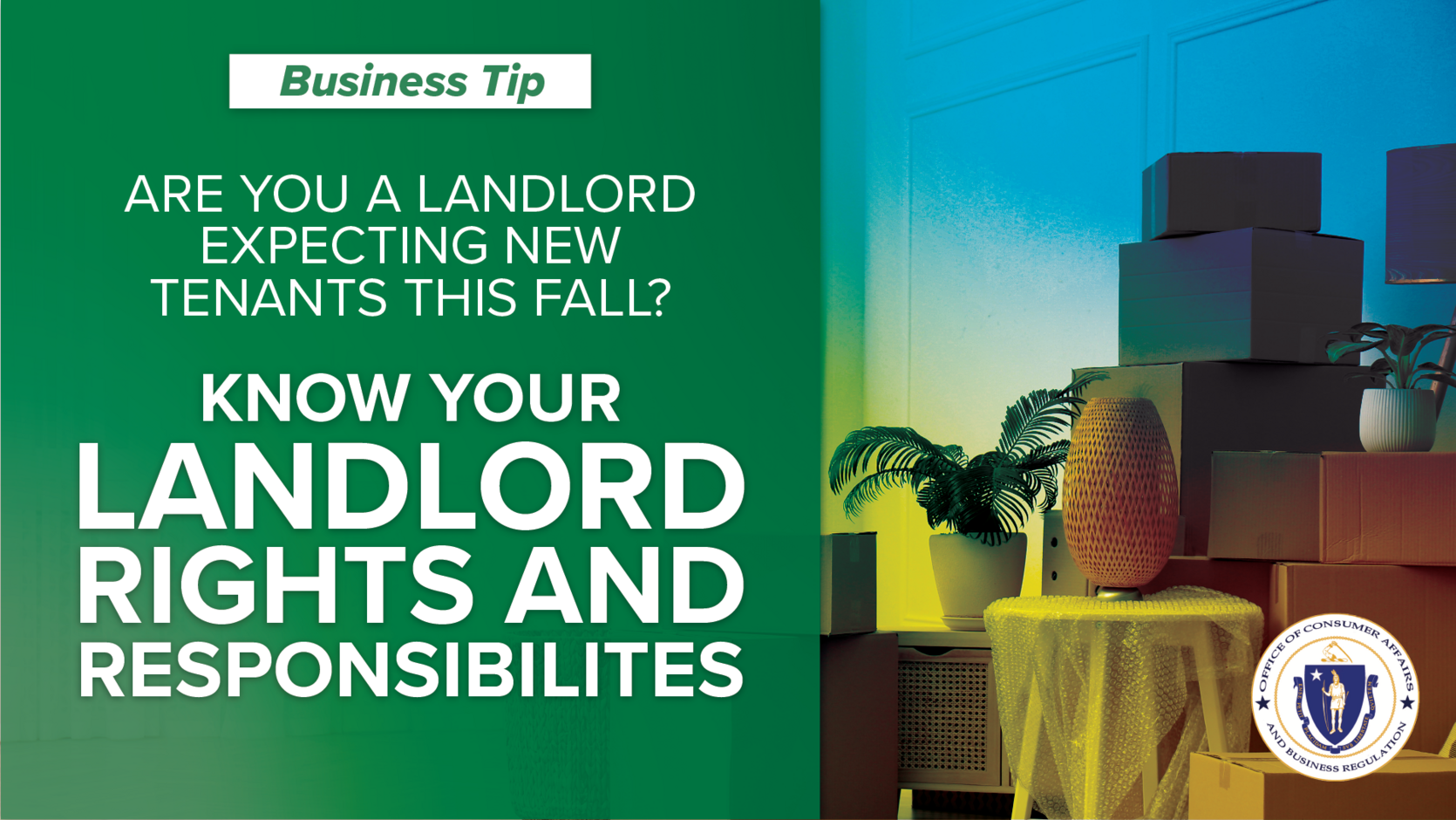- Office of Consumer Affairs and Business Regulation

Fall is right around the corner and that means many residents and students will be signing new leases with property landlords. According to the US Census Bureau, nearly 40% of households in Massachusetts were renters in 2019. With such a large population of renters, landlords have an obligation to provide safe, clean, and habitable apartments. Just as tenants should be aware of their rights, landlords must understand their responsibilities to ensure a mutually beneficial rental experience.
There are two types of tenancies a landlord can offer: tenant-under-lease and tenant-at-will. A tenant-under-lease has a signed written agreement for a specified period with a set monthly charge. A tenant-at-will does not have a formal lease and rent is paid periodically based on the landlord’s arrangement. Further, a tenant-under-lease has additional protections: rent may not be increased until the end of the lease (unless otherwise stated), and eviction cannot occur unless a provision of the lease is violated. While a tenant-at-will may have their rent increased if given proper notice, and tenancy may be terminated with 30-day advance written notice (or one full rental period).
The Office of Consumer Affairs and Business Regulation (OCABR) protects and empowers consumers. In support of that mission, OCABR compiled a variety of information on renting in the Bay State for current and prospective landlords.
Signing a lease:
- All rules applying to a tenant should be specifically outlined in a signed written agreement.
- Landlords may require tenants to pay utilities, including electricity and gas. This should be included in the lease to protect landlords from owing any unpaid balances.
- Once a landlord signs a lease agreeing on the length of tenancy and rent amount, they are unable to changes these terms unless the tenant fails to satisfy a condition of the lease.
Payments and security deposits
- Only a licensed broker or salesperson can lawfully collect a finder’s fee for bringing together a landlord and a tenant.
- Landlords may demand first and last month’s rent, a security deposit, and the cost of a new lock and key for the apartment up front. Any payment that is made should come with a signed detailed receipt.
- Monthly payment is due pursuant to the agreement between the landlord and tenant. Interest or a penalty on late rent cannot be charged until 30-days after the due date.
- Security deposits must be deposited in an interest-bearing account at a Massachusetts financial institution within the first month of the tenancy. Landlords are obligated to provide tenants a “statement of condition” within 10-days of the start of tenancy, or upon receipt of the security deposit detailing the condition of the apartment.
- Upon completion of a lease, a security deposit and interest must be returned within 30-days to the tenant. Keep in mind that landlords may retain amounts to cover any unpaid rent, repair costs, and/or any of the tenant’s share in increase of the landlord’s property taxes. When keeping any part of a security deposit, a landlord is required to provide a written description of the damage and an estimate of repair costs within 30-days. Costs associated with reasonable wear and tear due to normal use of the apartment may not be deducted from a security deposit.
- Tenants may be entitled to immediate return of a security deposit in certain circumstances.
Habitability and privacy
- Before renting out a property, landlords should inspect the premises to ensure that it is safe, habitable, and in compliance with the State Sanitary Code.
- Landlords may enter a tenant’s apartment for repairs, inspections, or showings. However, a landlord must coordinate entrance to the property with the tenant to arrange a mutually convenient time to visit.
- Landlords can only enter an apartment without approval if there is an emergency threatening the entire building, or if the tenant appears to have abandoned the property.
Being a landlord is not always an easy job. Landlords must comply with codes and state laws mentioned above in addition to the Fair Housing Law. Visit the Office of Consumer of Consumer Affairs web resources for more information about landlord rights and tenant rights.

